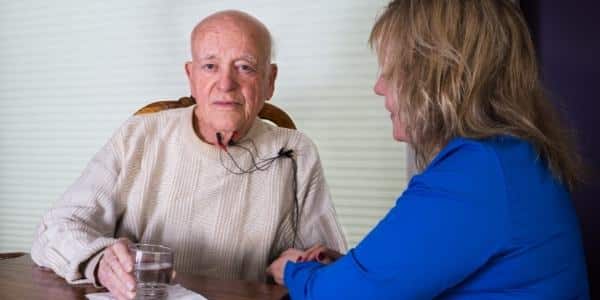What is Speech Therapy?
Speech therapy is the kind of therapy that works to fix any speech impediments and disorders the participant may have. This is performed by speech-language pathologists thatare often referred to as speech therapists. By fixing certain disorders, the individuals are more likely to be more active in their communities and have greater social lives. In most cases, speech therapy is needed for people who have speech disorders that develop in childhood or speech impairments in adults caused by an injury or a mental illness such as brain damage or damage to vocal cords. The amount of time the person needs to get speech therapy also depends on a few core factors. These factors include the participants’ age, the severity of their speech impairment and the treatment needed for their medical condition.

Find out more...
Fill in the form below and one of our consultants will be in touch with you regarding our services.
What Does a Speech Therapist Do?
Speech therapists, or speech-language pathologists, are professionals who are educated in the study of human communication disorders and it’s development. Speech therapists also assess the speech, language and cognitive communication of the individual which lets them identify and treat the disorder. Speech therapists always have; a master’s degree in their respective field, state certification and a certificate of clinical competency from the American Speech-Language-Hearing Association (ASHA). In speech therapy, a therapist works with a child one-on-one, in a small group or in a classroom to solve their problems. Therapists use a wide variety of techniques, these strategies include but are not limited to:
Language Intervention Activities
The speech therapists interact with the individual by using books, objects, pictures or by talking about ongoing events to stimulate and encourage language development.
Articulation Therapy
In articulation therapy, speech therapists correct sounds and syllables in words and sentences for a child often during play activities. Play activities are often age-appropriate and they’re usually related to the kids’ specific needs.
Oral Feeding and Swallowing Therapy
The speech therapist uses a variety of oral exercises to strengthen the muscles in the face for the ease of swallowing and eating.

NDIS Speech Therapy
Speech and language skills are essential when learning, understanding and trying to be an active part of the community. That’s why it can be hard for some children and adults to communicate efficiently with speech impairments. This can affect their personal independence as a part of their community. Since NDIS funds for supports that are related to your goals, it’s important to include the goals you have, that are related to your speech disorder, in your plan.
Speech Therapy for Kids
Children might need speech therapy for many different reasons including autism, brain injury, hearing impairments, developmental delays, fluency disorders and weak oral muscles. Early therapy and interventions are really important; children who start therapy earlier tend to get better results at the end than those who begin later. This doesn’t mean that kids who begin later won’t get results in therapy. It just means that their progress might be slower and tougher than other younger kids.

Speech Therapy for Adults
Speech therapy for adults, just as with speech therapy for kids, starts with the assessment of the disorder. After which, the best treatment for disability is determined. Adults can benefit from speech therapy to improve their speech, language and cognitive communication. The therapy can also include exercises for retaining swallowing functions if an injury has caused swallowing difficulties. The exercises for adults include memory and problem solving activities that are geared at improving cognitive communication, breathing exercises, conversational techniques to improve social communication and exercises to strengthen oral muscles. If the individuals are not able to leave their houses, they can also get online speech therapies or they can use speech therapy apps.

Online Speech Therapy
People who want to try online speech therapy need a computer or a mobile device that has a strong internet connection and most practices require the download of apps like zoom or skype. Both the therapist and the individual needs to be in quiet and in well-lit rooms for the therapy to be efficient. The benefits of online therapy is that the individual can remain in a comfortable and familiar space rather than needing to travel to another building, so they don’t need to think about travel time to make it to appointments or they don’t have to think about transport. Online therapy can be really useful for people who live outside metropolitan areas or individuals with limited mobility.
Speech Therapy for Autism
Speech therapy can help people with autism to improve their verbal, nonverbal and social communication skills. Even for people with autism, the challenges are variable from person to person. Some individuals with autism can’t speak, and some love to talk but they can’t hold conversations very well. So the speech therapy program begins with the evaluation and assessment of the situation and a treatment is determined after.

What is the Difference Between Speech Therapy and Speech Pathology?
They’re actually the same. The only difference is that a speech pathologist has more knowledge and understanding of speech impairments. This means that a speech pathologist has more knowledge of actions that need to be taken to improve speech issues. On the other hand, a speech therapist is a person that takes action with the knowledge that they already have through sessions and interventions.
Where Can I Find a Speech Therapist?
Speech disorders are a common thing in Australia, so if you have speech therapy in your NDIS plan, you can get in contact with any of our speech pathologists in Sydney. If you have any suspicion whether anyone close to you might need extra provision, feel free to contact us. You can also ask any question you might need answered about our services. As the team of ADACSS, we are here to help anyone that might need help in Sydney. Get in touch by calling us at 0292327055, send us an email or book online.
Why choose ADACSS?

Free consultation
We will meet with you to offer free advice and support without obligation. We pride ourselves on turning things around quickly.

Individual support package
Everyone's needs and wants are different, therefore we listen to you and make a tailored plan based on your requirements.

Ongoing support
Once everything has been agreed and services commence, we will discuss and feedback on changes if needed.


